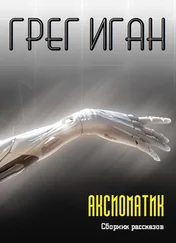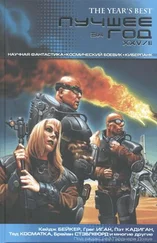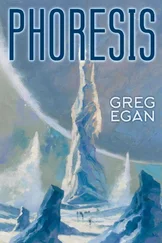“Good morning, Bruno. How is the weather there in Sparseland?”
The screen icon for my interlocutor was a three-holed torus tiled with triangles, endlessly turning itself inside out. The polished tones of the male synthetic voice I heard conveyed no specific origin, but gave a sense nonetheless that the speaker’s first language was something other than English.
I glanced out the window of my home office, taking in a patch of blue sky and the verdant gardens of a shady West Ryde cul-de-sac. Sam used “good morning” regardless of the hour, but it really was just after ten A.M., and the tranquil Sydney suburb was awash in sunshine and birdsong.
“Perfect,” I replied. “I wish I wasn’t chained to this desk.”
There was a long pause, and I wondered if the translator had mangled the idiom, creating the impression that I had been shackled by ruthless assailants, who had nonetheless left me with easy access to my instant messaging program. Then Sam said, “I’m glad you didn’t go for a run today. I’ve already tried Alison and Yuen, and they were both unavailable. If I hadn’t been able to get through to you, it might have been difficult to keep some of my colleagues in check.”
I felt a surge of anxiety, mixed with resentment. I refused to wear an iWatch, to make myself reachable twenty-four hours a day. I was a mathematician, not an obstetrician. Perhaps I was an amateur diplomat as well, but even if Alison, Yuen, and I didn’t quite cover the time zones, it would never be more than a few hours before Sam could get hold of at least one of us.
“I didn’t realize you were surrounded by hotheads,” I replied. “What’s the great emergency?” I hoped the translator would do justice to the sharpness in my voice. Sam’s colleagues were the ones with all the firepower, all the resources; they should not have been jumping at shadows. True, we had once tried to wipe them out, but that had been a perfectly innocent mistake, more than ten years before.
Sam said, “Someone from your side seems to have jumped the border.”
“ Jumped it?”
“As far as we can see, there’s no trench cutting through it. But a few hours ago, a cluster of propositions on our side started obeying your axioms.”
I was stunned. “An isolated cluster? With no derivation leading back to us?”
“None that we could find.”
I thought for a while. “Maybe it was a natural event. A brief surge across the border from the background noise that left a kind of tidal pool behind.”
Sam was dismissive. “The cluster was too big for that. The probability would be vanishingly small.” Numbers came through on the data channel; he was right.
I rubbed my eyelids with my fingertips; I suddenly felt very tired. I’d thought our old nemesis, Industrial Algebra, had given up the chase long ago. They had stopped offering bribes and sending mercenaries to harass me, so I’d assumed they’d finally written off the defect as a hoax or a mirage, and gone back to their core business of helping the world’s military kill and maim people in ever more technologically sophisticated ways.
Maybe this wasn’t IA. Alison and I had first located the defect—a set of contradictory results in arithmetic that marked the border between our mathematics and the version underlying Sam’s world—by means of a vast set of calculations farmed out over the internet, with thousands of volunteers donating their computers’ processing power when the machines would otherwise have been idle. When we’d pulled the plug on that project—keeping our discovery secret, lest IA find a way to weaponize it—a few participants had been resentful, and had talked about continuing the search. It would have been easy enough for them to write their own software, adapting the same open source framework that Alison and I had used, but it was difficult to see how they could have gathered enough supporters without launching some kind of public appeal.
I said, “I can’t offer you an immediate explanation for this. All I can do is promise to investigate.”
“I understand,” Sam replied.
“You have no clues yourself?” A decade before, in Shanghai, when Alison, Yuen, and I had used the supercomputer called Luminous to mount a sustained attack on the defect, the mathematicians of the far side had grasped the details of our unwitting assault clearly enough to send a plume of alternative mathematics back across the border with pinpoint precision, striking at just the three of us.
Sam said, “If the cluster had been connected to something, we could have followed the trail. But in isolation it tells us nothing. That’s why my colleagues are so anxious.”
“Yeah.” I was still hoping that the whole thing might turn out to be a glitch—the mathematical equivalent of a flock of birds with a radar echo that just happened to look like something more sinister—but the full gravity of the situation was finally dawning on me.
The inhabitants of the far side were as peaceable as anyone might reasonably wish their neighbors to be, but if their mathematical infrastructure came under threat they faced the real prospect of annihilation. They had defended themselves from such a threat once before, but because they had been able to trace it to its source and understand its nature, they had shown great forbearance. They had not struck their assailants dead, or wiped out Shanghai, or pulled the ground out from under our universe.
This new assault had not been sustained, but nobody knew its origins, or what it might portend. I believed that our neighbors would do no more than they had to in order to ensure their survival, but if they were forced to strike back blindly, they might find themselves with no path to safety short of turning our world to dust.
* * *
Shanghai time was only two hours behind Sydney, but Yuen’s IM status was still “unavailable.” I emailed him, along with Alison, though it was the middle of the night in Zurich and she was unlikely to be awake for another four or five hours. All of us had programs that connected us to Sam by monitoring, and modifying, small portions of the defect: altering a handful of precariously balanced truths of arithmetic, wiggling the border between the two systems back and forth to encode each transmitted bit. The three of us on the near side might have communicated with each other in the same way, but on consideration we’d decided that conventional cryptography was a safer way to conceal our secret. The mere fact that communications data seemed to come from nowhere had the potential to attract suspicion, so we’d gone so far as to write software to send fake packets across the net to cover for our otherwise inexplicable conversations with Sam; anyone but the most diligent and resourceful of eavesdroppers would conclude that he was addressing us from an internet café in Lithuania.
While I was waiting for Yuen to reply, I scoured the logs where my knowledge miner deposited results of marginal relevance, wondering if some flaw in the criteria I’d given it might have left me with a blind spot. If anyone, anywhere had announced their intention to carry out some kind of calculation that might have led them to the defect, the news should have been plastered across my desktop in flashing red letters within seconds. Granted, most organizations with the necessary computing resources were secretive by nature, but they were also unlikely to be motivated to indulge in such a crazy stunt. Luminous itself had been decommissioned in 2012; in principle, various national security agencies, and even a few IT-centric businesses, now had enough silicon to hunt down the defect if they’d really set their sights on it, but as far as I knew Yuen, Alison, and I were still the only three people in the world who were certain of its existence. The black budgets of even the most profligate governments, the deep pockets of even the richest tycoons, would not stretch far enough to take on the search as a long shot, or an act of whimsy.
Читать дальше









![Грег Иган - Рассказы [компиляция]](/books/419837/greg-igan-rasskazy-kompilyaciya-thumb.webp)
